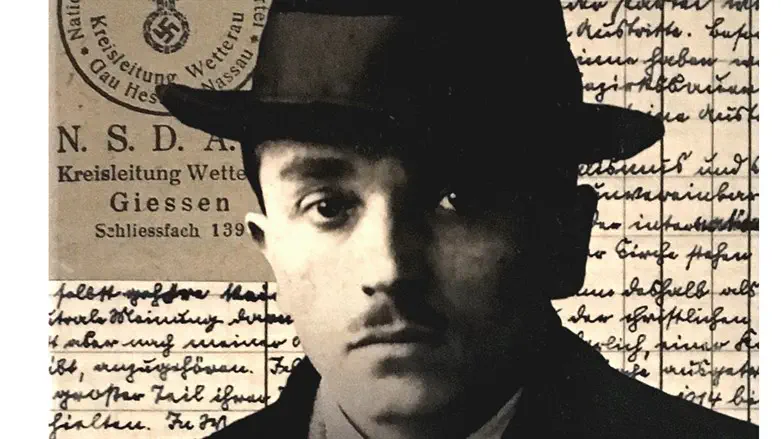
In mid-November, the chairman of Yad Vashem: The World Holocaust Remembrance Center in Jerusalem, Dani Dayan, met with U.S. university presidents about the pro-Palestinian Arab student demonstrations on their campuses. He pointed out how students were parroting their professors: Israelis were "occupiers" and "oppressors"; therefore, all attacks against them, including October 7, were justified.
Dayan said it would be "an uphill battle" to convince prejudiced educators to accept historical truth. "But it is a battle that should be addressed starting today," he insisted.
No. Dayan's institution should have started this battle thirty years ago, in 1993, when it might have been won. But, for example, Yad Vashem turned down the chance to obtain a 900-page diary that counters Holocaust deniers and revisionists in a way few other documents do. I had sent a letter to Yad Vashem offering to give them my German grandfather’s unique diary. Justice Inspector Friedrich Kellner had campaigned as a Social Democrat in the Weimar Republic against Hitler and the Nazi Party. When Hitler came to power, Friedrich began a diary, while under Gestapo surveillance, to record Nazi crimes. He considered his writings "a weapon of truth" for future generations to use against their own Nazis--as we find with Hamas and their fellow Islamic terrorists.

One aspect of Friedrich's "weapon of truth" that is especially relevant for Chairman Dayan is the theme of deluded pro-Nazi German professors.
"Whoever has an opportunity to get a look into the egotistical soul of the academics will shudder upon seeing the mental dissolution of this class."
"Since 1933, the vast majority of intellectual leaders--with university professors in the forefront--shoved aside everything that they had previously stood up for and taught. They devoted themselves entirely to the new political reality. What can a simple man say of such scholars and scientists who no longer dare to give expression to their better judgment?"
"The deeds of these teachers are especially woeful. Poverty of spirit unlike anything else. Nothing remains of their earlier virtue. Now only arrogance."
"And let us not forget how professors—and judges, lawyers, and physicians--always behaved as the worst anti-Semites: from professional jealousy!"
"Poor German students. How are they supposed to obtain worldly wisdom from such examples?"
On May 31, 1993, Yad Vashem's Director of Archives, Yaacov Lozowick, responded to my offer. "We are VERY interested in your grandfather’s diary," he wrote. But he could not meet my one condition: that Yad Vashem publish the diary and use it to actively combat antisemitism. "As to publishing the diary," Lozowick wrote, "to be honest, I don’t see how Yad Vashem can publish it in its entirety. And I have thousands of documents that cry out to be published."
I then tried the new Holocaust museum in Washington, DC. and got the same response: they were eager for the diary but not to publish and use it.
Try as I might, I could not convince any Jewish organization that "Never Again" had already become meaningless in the face of increased antisemitism and threats from Iran and its terrorist minions.
In 2003, I found an ally in a former combat pilot who served in WWII. President George H. W. Bush recognized the diary's significance and arranged for a 2005 exhibit at his presidential library to commemorate the 60th anniversary of VE Day. That was followed by an exhibit in the Dwight Eisenhower Presidential Library.
One month before the opening of the Bush exhibit, I read about Yad Vashem's 100-million dollar ($100,000,000) renovation. They had money, evidently, for fresh paint but not for documents "that cry out to be published." Then the Washington DC museum sent their archivist, Henry Mayer, to see the Bush exhibit. He was highly impressed but repeated they could not guarantee publication.
After another six years, with the help of some German colleagues and Heidelberg University, I published the complete diary in Germany in two volumes, 1,100 pages, where it received wide acclaim. Europe's premiere magazine, Der Spiegel, echoed my faith in it: "Kellner fashioned an image of Nazi Germany that has never existed before in such a vivid, concise and challenging form. He reveals what everyone could have known about the war of extermination in the East, the crimes against the Jews and the acts of terror committed by the Nazi Party."
Poland and Russia published translations.
When Cambridge University Press published my English translation in 2018, Yad Vashem got back in touch. They invited me to be a keynote speaker at their Holocaust Education Conference and asked me to bring some notebooks of the diary for an exhibit. They had the German and English editions of the diary in their library and would add them to the exhibit.
Friedrich Kellner was finally at Yad Vashem--at least for a speech and a brief exhibit.
A vexing question persists: If in 1993, Yad Vashem had committed to publishing Friedrich Kellner's diary - and who knows what else - and tenaciously used it against the current enemies of Jews, would Chairman Dayan have such an uphill battle today? For that matter, considering other relevant entries in the weapon of truth, would the Israeli government have tried earlier to put an end to Hamas? "Only intensive preventive measures can stop an enemy’s incessant aggression," wrote Friedrich Kellner in 1940. "The sharpest means would still be too mild."
Robert Scott Kellner,a navy veteran, is a retired English professor who taught at the University of Massachusetts and Texas A&M University. The grandson of Friedrich Kellner, he published the diary in Germany in 2011 and is the editor and translator of My Opposition: The Diary of Friedrich Kellner--A German against the Third Reich, Cambridge University Press, United Kingdom.